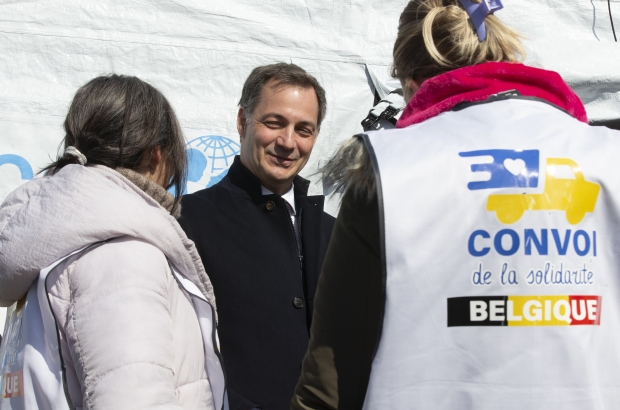- Daily & Weekly newsletters
- Buy & download The Bulletin
- Comment on our articles
De Croo sees Belgian aid in action in visit to Ukrainian border posts
Thirty trucks chartered by the Belgian First Aid and Support Team (B-Fast), 14 by the federal health department, and €85 million released so far. These are the current figures for aid granted by Belgium following the Russian invasion of Ukraine, reports RTBF.
Prime minister Alexander De Croo saw first-hand how this aid is being distributed and put to use when he visited humanitarian workers near the Ukrainian border on Tuesday.
The prime minister, continuing his Eastern European ‘solidarity’ tour, arrived at the Rzeszow depot in Poland, 80 kms from the border, after talks with his Polish counterpart Mateusz Morawiecki. The depot is a staging post from which some of the humanitarian supplies destined for Ukraine cross into the war-torn country.
On the ground, Belgian humanitarian officials work in consultation with the local authorities, in particular the Ukrainian Civil Protection, and follow their requests. The material is transported across the border by drivers who know the area. Belgian aid crossing into Ukraine has so far consisted of food, generators, drinking water, tents, medicines, hygiene kits and medical equipment. Two new deliveries were being prepared.
Of the €85 million provided by Belgium, €70 million is distributed between international organisations working on the Ukraine crisis such as the Office of the United Nations High Commissioner for Refugees, the UN Office for the Coordination of Humanitarian Affairs (OCHA) or the World Food Programme. The remaining €15 million are specifically allocated, notably via B-Fast, OCHA and UNICEF.
Prime minster De Croo also visited the border post of Medyka, one of the crossing points for Ukrainians fleeing their country. UNICEF receives refugees at Medyka, providing initial help and information, a sim card for their phones and other small supplies. But they do not stay here; the refugees are referred to reception centres further inside Poland, if necessary.
Refugees mainly women and children
"What is special about this crisis is that the refugees are essentially women and children who deserve special protection," said UNICEF chief of communications Daniel Timme. "It is believed that there's a lot of abuse happening and human traffickers working on the borders, and we must prevent this."
UNICEF provides practical advice to refugees, including how to protect themselves from traffickers. It also participates in the specialist training of border guards, cooperates with the Polish authorities and provides psychological assistance. "We are facing people who have left behind a part of their lives, often relatives, and have seen terrible things," Timme said.
Alongside these recognised organisations, many private initiatives have flourished, with many individuals from around Europe arriving to help the Ukrainian refugees. All this gives the Medyka border crossing the air of an improvised market where NGO workers, police officers, representatives of mobile phone operators, private volunteers and even street entertainers rub shoulders.
Among those who met De Croo was Félix Dérison, a former school director from Liège who set up the Liège-Ukraine solidarity association six weeks ago. His organisation organises the transport of refugees to Belgium through local actors and their reception in families.
While many thousands have been forced from their homes by the conflict, it's clear by the numbers waiting at Medyka to cross back into Ukraine, that many are also returning home. According to recent figures from the Ukrainian ministry of the interior, 500,000 have returned, even if this is sometimes temporary.

















